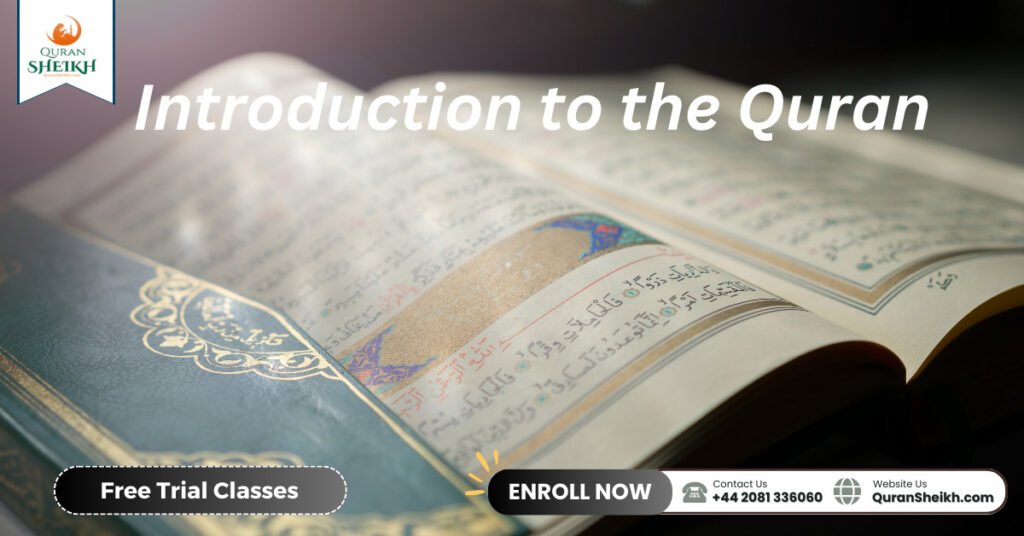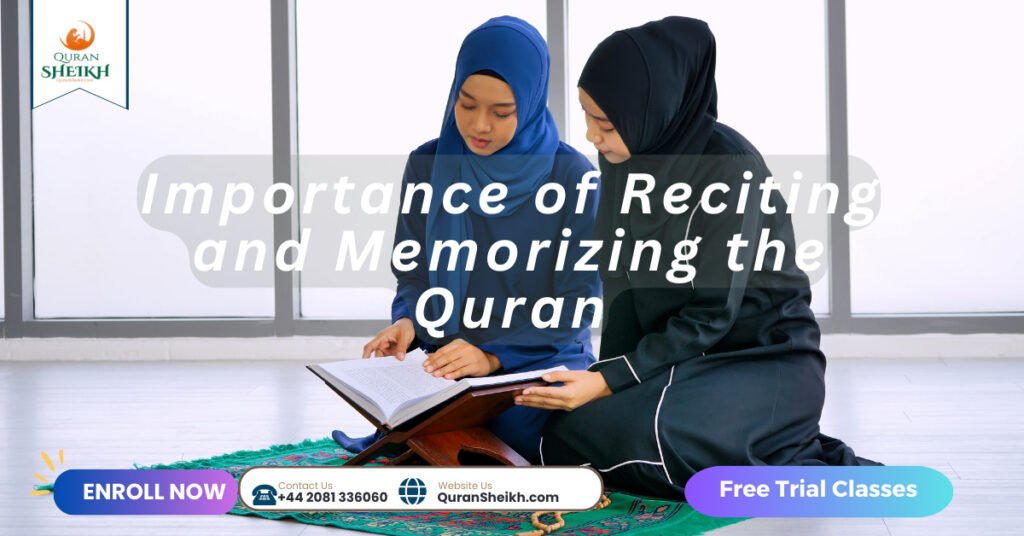Learn the Quran: Muslims from all corners of the globe hold the revered Quran, Islam’s sacred scripture, in great esteem. It is not only a religious scripture but also serves as a comprehensive guide for leading a righteous life.
Understanding the Quran is a lifelong journey of discovering its wisdom, guidance, and spiritual upliftment. This article will delve into the various aspects of learning the Quran, including its origin and structure, the importance of reciting and memorizing it, exploring its profound themes and messages, mastering proper pronunciation through Tajweed, utilizing tools and resources for Quranic study, and understanding the numerous benefits that come with studying and embracing the Quran’s teachings.
Join thousands of Muslim Families who love learning Quran, Arabic and Islamic Studies from the comfort of their Homes.
1. Introduction to the Quran

The Quran. It’s possible that you’re familiar with it, although you might lack precise knowledge of its nature or why it holds such importance.
1.1 The Origin and Compilation of the Quran
Believers in Islam hold the perspective that the Quran is the divine book guiding their religious practices and teachings, bestowed upon them by God Himself.
It was revealed to the Prophet Muhammad over a period of 23 years in the 7th century CE. The compilation of the Quran into a sole book took place shortly after the Prophets, guaranteeing its protection for future generations.
1.2 The Significance of the Quran in Islam
The Quran holds immense significance for Muslims. It serves as a guide for every aspect of their lives, providing spiritual guidance, moral teachings, and a framework for worship.
The conviction of Muslims stands strong in their perception that the Quran embodies the verbatim utterances of God, thereby granting it unparalleled power as a fount of knowledge and jurisdiction.
2. Understanding the Structure and Language of the Quran

Now that we have gained a fresh comprehension of the Qurans source and significance, we are equipped to delve into analyzing its complex composition and linguistic aspects.
It is now the moment to delve into the structure and language of the Quran, after gaining understanding about its origins and importance.
2.1 Divisions and Chapters of the Quran
The Quran is divided into 114 chapters, known as Surahs. Each Surah varies in length, with some containing just a few verses and others spanning several pages. These Surahs are further divided into verses, known as Ayahs. The Quran’s division into Surahs and Ayahs helps with easy referencing and memorization.
2.2 Exploring the Verses and Ayahs
The sacred Quran is enriched with profound wisdom and divine guidance.. A broad spectrum of subjects are addressed, encompassing faith, ethics, fairness, and societal concerns.
By delving into these verses, Muslims can acquire a profound comprehension of their faith and implement its instructions into their everyday existence.
2.3 Key Arabic Terms and Translations
The Quran was originally revealed in Arabic, so it’s helpful to familiarize ourselves with some key Arabic terms. Though translations into diverse languages are available, it is crucial to bear in mind that the true essence of the Quran may occasionally get diluted through translation.
Nevertheless, translations enable non-Arabic speakers to access the wisdom of the Quran and grasp its core teachings.
Quran Memorization Course Online with an Arab teacher with 30% Off
3. Importance of Reciting and Memorizing the Quran

Reciting and memorizing the Quran is a highly regarded practice in Islam.
3.1 The Merits and Rewards of Reciting the Quran
Muslims believe that reciting the Quran brings numerous rewards and blessings. It’s seen as a means of connecting with God, seeking His guidance, and finding solace.
Additionally, reciting the Quran is considered a virtuous act that brings spiritual purification and reward in this life and the hereafter.
3.2 Benefits of Memorizing the Quran
Memorizing the Quran is a feat that many Muslims strive to achieve. Continuous reflection and contemplation are not the only benefits of delving deeper into the Quran; it also enhances one’s understanding. Memorization helps to preserve the Quran’s teachings and ensures that it remains intact and free from alteration.
4. Exploring the Themes and Messages of the Quran
Embark on an enlightening journey into the diverse themes and profound messages depicted in the Quran.
4.1 Monotheism and the Oneness of God
Tawheed, the belief in the oneness of God, is a central theme found within the Quran. The Quran emphasizes monotheism and rejects the concept of associating partners with God. It calls upon believers to worship and submit to God alone.
4.2 Guidance for Moral and Ethical Living
The Quran provides a comprehensive guide for moral and ethical conduct. Upholding principles of honesty, justice, compassion, and kindness is emphasized in this statement, advocating for believers to practice these values in their engagements with others.
The moral guidance provided by the Quran serves as a navigational tool for Muslims to steer through their daily routines.
4.3 Mercy, Compassion, and Justice in the Quran
The Quran highlights the importance of mercy, compassion, and justice. The importance lies in demonstrating kindness and empathy towards every creation of God, be it humans, animals, or the environment. The Quranic teachings on justice call for fairness, equality, and standing up against oppression.
After getting a glimpse into the Quran and its diverse aspects, why not seize the chance to delve deeper into this extraordinary book? Over the course of time, this treasure trove has influenced countless lives by imparting invaluable wisdom, guidance, and inspiration.
5. Learning the Tajweed: Proper Pronunciation and Recitation
5.1 Basics of Tajweed and its Importance
Mastering the Quran goes beyond deciphering the words inscribed on a parchment; it entails comprehending and internalizing its profound teachings. One crucial aspect of this is mastering the art of Tajweed, which refers to the rules and techniques for proper pronunciation and recitation.
Tajweed is important because it helps preserve the beauty and integrity of the Quranic text. By learning Tajweed, you ensure that you’re reciting the words of Allah in the most accurate and melodious way possible. It enables you to grasp the nuances of each letter, vowel, and syllable, enhancing your understanding and connection with the Quran.
5.2 Rules and Techniques of Tajweed
Tajweed covers a wide range of rules and techniques to improve your recitation. For example, it teaches you how to elongate certain vowels, apply appropriate pronunciation characteristics, and smoothly transition between letters. These rules can be complex, but with practice and guidance, anyone can become proficient in Tajweed.
It’s important to note that Tajweed isn’t just for advanced learners; even beginners can benefit from incorporating its basic principles into their recitation.
By focusing on correct pronunciation and clarity, you’ll find a new level of appreciation for the beauty of the Quran’s verses.
5.3 Enhancing Recitation Skills
Improving your recitation skills requires time and dedication. Regular practice is key, and you can start by reading the Quran out loud on a daily basis. In addition, listening to recitations by skilled Quranic reciters can serve as a valuable source of inspiration and guidance.
Seeking feedback from qualified Quran teachers or scholars can also greatly enhance your recitation skills. They can help identify areas for improvement and suggest specific exercises or techniques to overcome any challenges you may face. Remember, learning Tajweed is a journey, and with perseverance, your recitation will continue to improve over time.
6. Tools and Resources for Quranic Study
6.1 Quranic Study Apps and Websites
In todays era of technology, there is a vast array of applications and websites designed specifically for studying the Quran. These resources offer a range of features, such as translations, audio recitations, and Tajweed tutorials. Some popular Quranic study apps include “Quran Companion,” “Quran Explorer,” and “Quran Pro.”
The Quran’s teachings become easily accessible through these platforms, allowing for convenient reading, studying, and engagement. Whether you’re on your daily commute or relaxing at home, these apps and websites ensure that the Quran is always within reach.
6.2 Tajweed Courses and Learning Centers
If you prefer a more structured approach to learning Tajweed, you may consider enrolling in a Tajweed course or joining a Quranic learning center. These courses are often led by experienced teachers who can provide personalized guidance and feedback to help you master the intricacies of Tajweed.
Learners from all backgrounds can access it because many learning centers provide both in-person and online options. By joining such programs, you’ll have the opportunity to interact with fellow Quran enthusiasts, share knowledge, and engage in fruitful discussions.
6.3 Recommended Books and Tafsirs
While digital resources are convenient, there’s still something special about engaging with physical books. There are numerous books on Tajweed, Quranic interpretation (Tafsir), and related subjects that can greatly enrich your Quranic study.
Some popular books on Tajweed include “Tajweed Rules of the Quran” by Kareema Kari Pinski and “The Art of Tajweed” by Muhammad Salih al-Munajjid.
Hafiz Ibn Kathirs Tafsir Ibn Kathir and Seyyed Hossein Nasrs The Study Quran are highly recommended resources for individuals interested in Tafsir.
These books can serve as comprehensive references and valuable companions on your Quranic learning journey.
7. Benefits of Learning the Quran
7.1 Spiritual and Emotional Growth
Learning the Quran is an enriching experience that goes beyond acquiring knowledge. It has the power to transform you spiritually and emotionally. The Quran’s profound teachings can bring solace to your heart, provide guidance during difficult times, and deepen your connection with your faith.
Through its verses, the Quran addresses various aspects of human existence, offering insights into relationships, hardships, and the purpose of life. Studying the Quran allows you to reflect on these teachings, nurture your spirituality, and find inner peace.
7.2 Strengthening Faith and Connection with God
The Quran is the word of Allah, and through its study, you establish a direct connection with the Creator. As you delve deeper into its verses, you’ll encounter stories of prophets, lessons for righteous living, and reminders of God’s mercy and love.
By learning the Quran, you strengthen your faith and develop a more profound understanding of Islam. It helps you develop a personal relationship with Allah and reinforces your belief in His guidance.
7.3 Guidance for Daily Life and Decision Making
The Quran is a comprehensive guidebook that provides practical wisdom for navigating the complexities of daily life. Spanning a broad spectrum of subjects, its teachings encompass morality, ethics, social justice, and personal growth.
By studying the Quran, you acquire an invaluable source of eternal wisdom that guides you towards informed and ethical decisions. Through incorporating its principles into your daily routine, you will discover valuable insights on how to engage with individuals, make choices, and pursue a meaningful and gratifying life journey.
8. Conclusion: Embracing the Guidance of the Quran
Learning the Quran is a lifelong journey that offers countless rewards. By immersing yourself in its study, mastering Tajweed, and exploring its teachings, you embark on a transformative path of spiritual growth and personal development.
Embrace the guidance of the Quran, and let its wisdom illuminate your heart and illuminate your path. Discover a profound connection with Allah and an enhanced sense of purpose in your life through deepening your understanding of this divine book.
So, dive in, explore, and let the Quran be your constant companion on this beautiful journey of faith.
Conclusion: Embracing the Guidance of the Quran
Learning the Quran is a transformative and enriching experience that can deeply impact one’s spiritual journey. By exploring its structure, language, and themes, and by reciting and memorizing its verses, we connect with the divine wisdom and guidance it offers.
The Quran serves as a beacon of light, providing moral and ethical principles to navigate life’s challenges. As we delve into its teachings, we cultivate a deeper understanding of Islam and strengthen our connection with Allah.
Let us embrace the Quran as a lifelong companion, seeking its wisdom and implementing its teachings to lead a purposeful, righteous, and fulfilling life.
Is it possible to learn Quran online?
Some of the benefits of learning the Quran online include:
- Flexibility: You can study at your own pace and time, from anywhere in the world.
- Convenience: You don’t have to travel to a physical location to attend classes.
- Affordable: Online courses are often more affordable than traditional classes.
However, there are also some challenges to learning the Quran online:
- Lack of personal interaction: You won’t have the opportunity to ask questions or get feedback from a teacher.
- Distractions: It can be difficult to stay focused when you’re learning online, especially if you’re not in a dedicated learning environment.
If you’re considering learning the Quran online, I recommend doing your research to find a reputable course that meets your needs. You should also be prepared to put in the time and effort to learn the material. With dedication and hard work, you can successfully learn the Quran online.
Are online Quran classes good?
Online Quran classes can be a great way to learn the Quran, especially for those who live in areas where there are no local Quran schools or who have busy schedules that make it difficult to attend in-person classes. However, it is important to choose a reputable online Quran school that has qualified and experienced teachers. The best online Quran schools will offer a variety of courses, from beginner to advanced, and will provide personalized attention to each student. They will also use interactive tools and resources to help students learn the Quran effectively.
What age should you learn Quran?
The best age to start learning the Quran is between 5 and 7 years old. This is when children are most receptive to learning new things and have a strong memory. However, it is never too late to learn the Quran. Adults can also benefit from learning the Quran, as it can help them to improve their Arabic language skills, learn about Islamic teachings, and find peace and tranquility in their hearts.
Here are some of the benefits of learning the Quran at a young age:
- It helps children to develop a love for the Quran and Islam.
- It improves their memory and cognitive skills.
- It helps them to learn Arabic, which is the language of the Quran.
- It teaches them about Islamic teachings and values.
- It can help them to become better Muslims.
If you are a parent, you can encourage your child to learn the Quran by starting them at a young age. There are many resources available to help you teach your child the Quran, such as online courses, apps, and books. You can also find Quran memorization programs and Quran schools in your community.
No matter what your age, it is never too late to learn the Quran. The Quran is a source of guidance and wisdom for all people. By learning the Quran, you can find peace and tranquility in your heart and improve your relationship with Allah.
Best Quran memorization program with qualified Arab tutors and get 30% OFF, Quran classes for Kids
FAQ
1. What is the significance of learning the Quran?
Learning the Quran holds immense significance for Muslims as it is considered the word of Allah. It provides guidance for leading a righteous life, instills moral values, and strengthens one’s connection with Allah. It also offers spiritual and emotional growth, bringing peace and tranquility to the hearts of believers.
2. Is Arabic knowledge necessary for Quran comprehension?
To comprehend the teachings of the Quran, it is not mandatory to have knowledge of Arabic even though it is its original language. Many translations and interpretations of the Quran are available in different languages, allowing individuals to comprehend its messages. However, learning basic Arabic and Tajweed can enhance the understanding and appreciation of the Quran’s original text.
3. Is it necessary to memorize the entire Quran?
Memorizing the entire Quran, known as Hifz, is a highly respected practice, but it is not obligatory for all Muslims. It is a personal choice and a sign of devotion. However, memorizing even a few chapters or verses of the Quran is highly encouraged as it allows individuals to carry the Quran’s guidance with them and facilitates a deeper connection with its teachings.
4. What resources are available for learning the Quran?
There are numerous resources available for learning the Quran. These include Quranic study apps and websites, Tajweed courses and learning centers, recommended books and tafsirs (explanatory texts), and guidance from knowledgeable scholars or teachers.
It is important to seek authentic and reliable sources to ensure accurate understanding and interpretation of the Quranic teachings.


